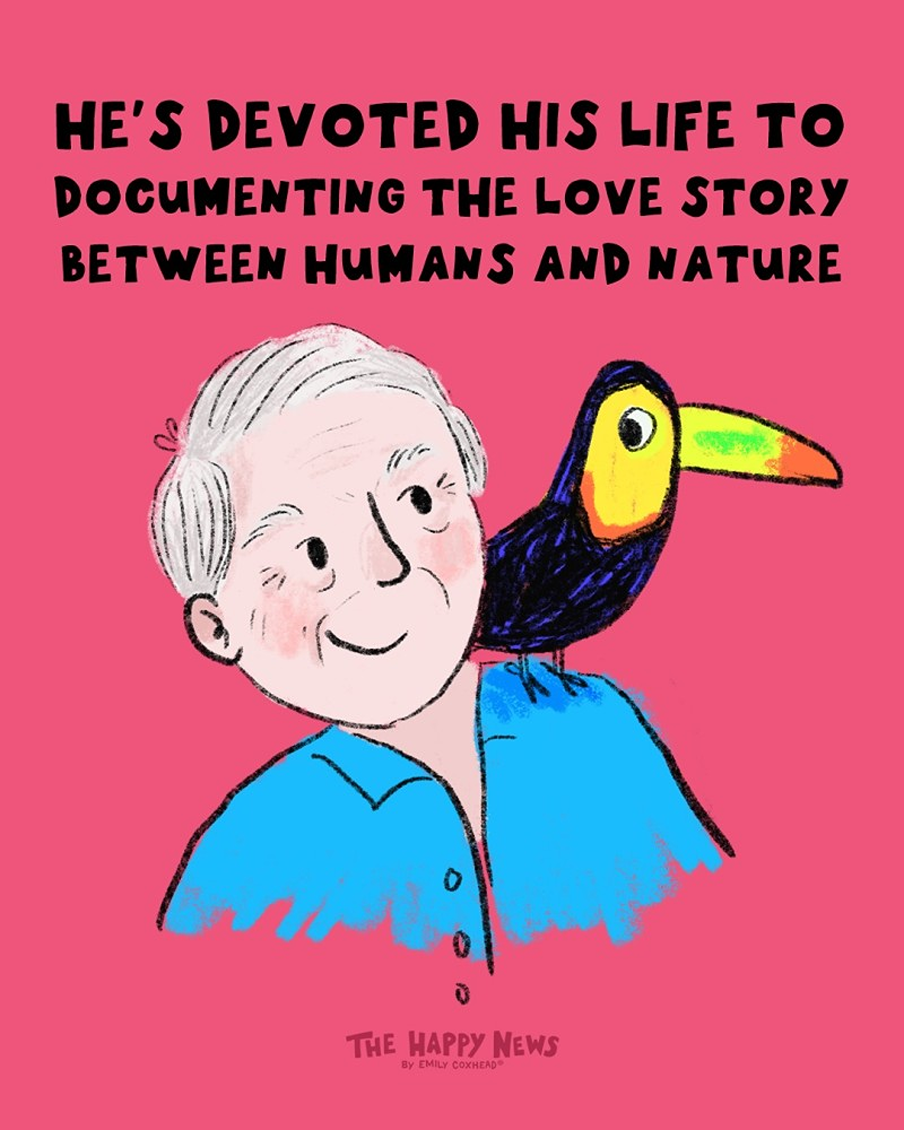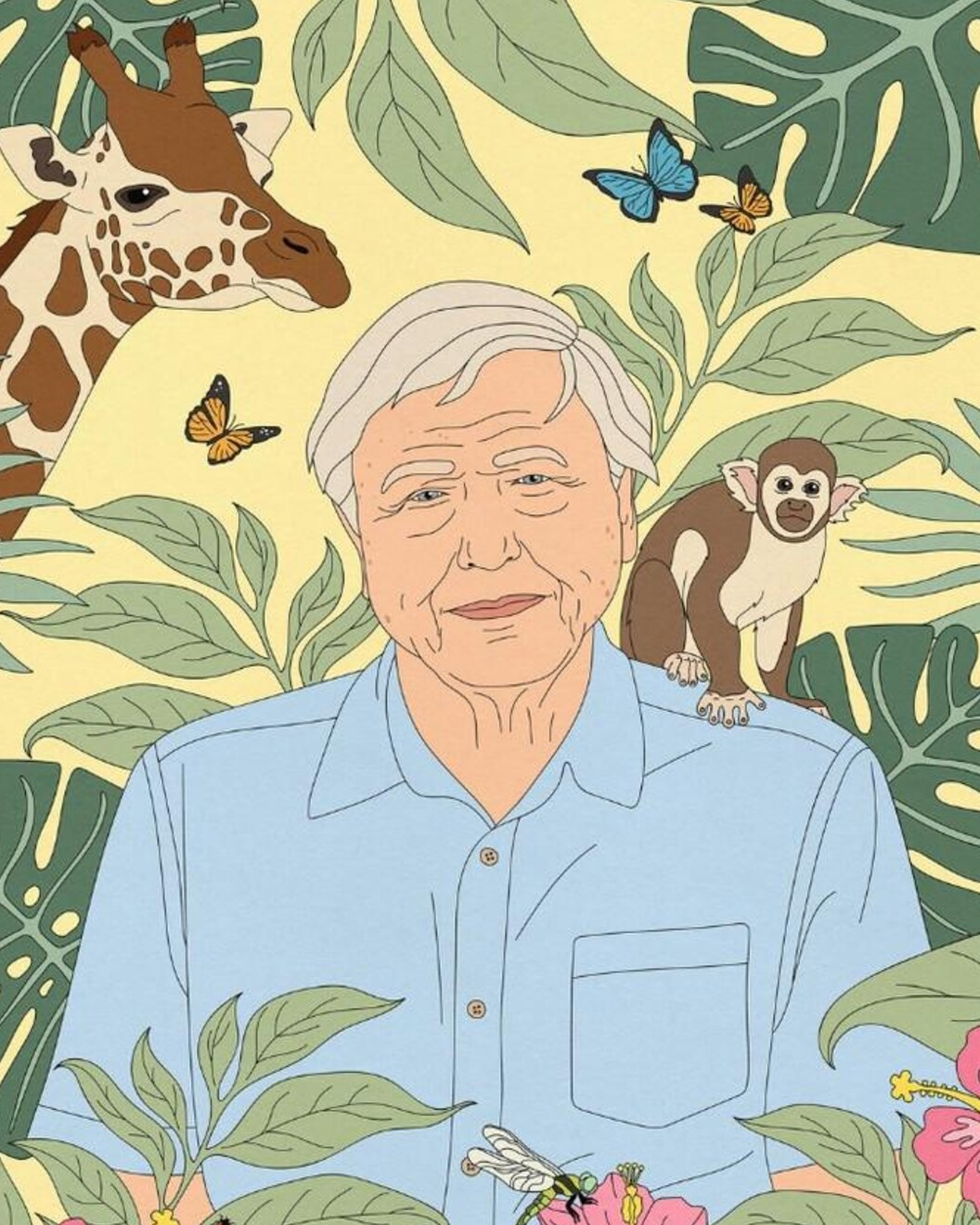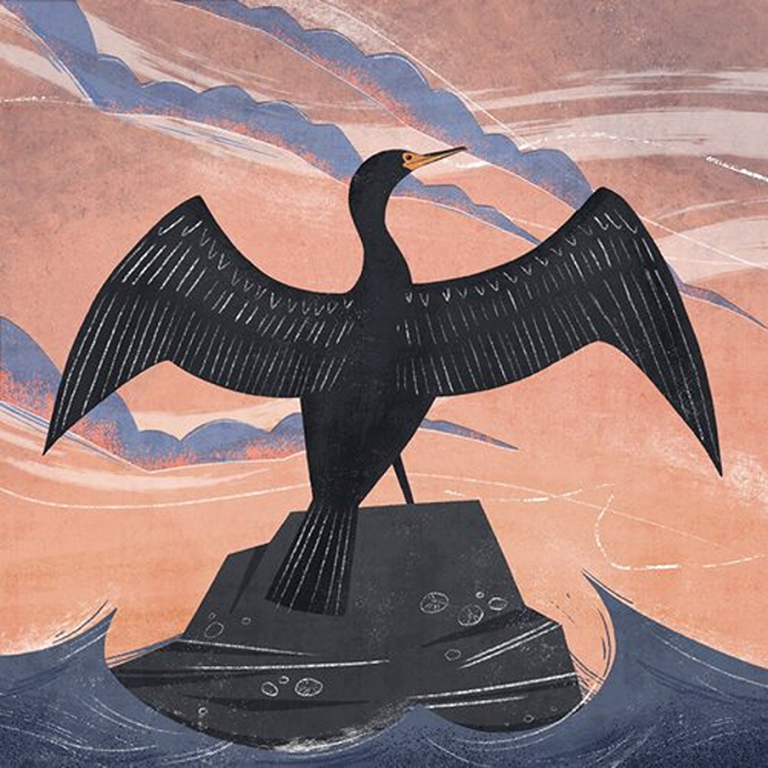
Sir David Attenborough was raised on campus at Leicester University, where his father was Principal. It was this love of learning that stayed with him for life (he has a degree in natural sciences, and also studied geology and zoology at Cambridge University).
This humble man (who sends letters over emails, has never learned to drive and has 18 plants and animals named after him) says it would be ‘rude to count’ how many degrees he has.
When asked what thing would improve his quality of life, he replied ‘good, workable knees!’
Attenborough’s engaging style and gentle authority have inspired generations to care about wildlife and conservation. He remains proud of his Leicester roots, often speaking about the local museums and parks that fired his imagination as a boy.
Happily married for 50 years until his wife died, David writes that with his ‘anchor gone’, returned to working on nature programs, to cope with grief. Their two children both work to help the natural world.
Not only has Sir David instilled a love of nature and wildlife for nearly everyone on earth, his programs to highlight plastic pollution is the reason why nearly every brand and online shop now has a ‘sustainability page’.
As people increasingly question how items are made and packaged. Sir David Attenborough has done more to help our planet, than any politician.
How Attenborough Drives Change
Attenborough’s BBC series have shaped public opinion for years. Planet Earth and Blue Planet educated millions on habitats, species, and threats. When viewers felt connected to a turtle caught in a drifting bag, or watched coral bleaching creep across a reef, they took notice. That emotional bond drove people to donate, sign petitions, and push politicians to act.
The numbers tell a story of cultural reach. Planet Earth II drew more than 12 million viewers for its UK debut. Blue Planet II became the most watched TV programme of 2017 in the UK, with the first episode attracting around 14 million viewers. These series broadcast to audiences in more than 100 countries, which pushed nature up the agenda far beyond Westminster. This is a megaphone no backbencher can match.
The content also met the moment. Blue Planet II highlighted ocean plastics with vivid, painful clarity. The public response was swift. Major retailers pledged to cut plastic packaging, cafés dropped plastic straws, and supermarkets trialled refill schemes. The UK introduced a ban on microbeads in 2018, followed by restrictions on plastic straws, stirrers, and cotton buds in 2020.
Government leaders publicly acknowledged the influence of the series on public pressure. Surveys reported large shares of viewers changing their habits on plastic use, and charities saw spikes in donations tied to broadcast weeks.
This is the power of storytelling, not as fluff, but as a lever for real outcomes. The programmes make complex ecological issues easy to grasp. People understand what is at stake, then act.
Planet Earth: Hidden Wonders and Urgent Threats
Planet Earth and Planet Earth II set a new bar for natural history. Rainforest sequences showed canopy life in rich detail, while desert scenes tracked rare predators across harsh ground. Coral reef episodes revealed the colour and structure of living cities, and the dead white shell left by heat stress.
These series worked closely with scientists and used cutting-edge camera rigs, which gave them credibility in content and method. Awards followed, along with a flood of classroom use and museum exhibits based on the footage. By making dense ecology visual and clear, the series helped viewers link habitat loss to daily choices.
Blue Planet Impact: From Screen to Plastic Action
Blue Planet II did more than wow with whales and fish shoals. It put plastic pollution at the centre of a national conversation. The sight of a turtle trapped in a plastic bag ran on the news, shared across social media, and then echoed in council chambers and boardrooms.
Campaigns like #BreakFreeFromPlastic gained new supporters, while UK policy tightened. The microbeads ban came into force, and later the ban on some single-use plastics followed. Supermarkets reported sharp drops in sales of single-use carrier bags, and several brands invested in packaging trials.
Surveys found that many viewers changed their use of single-use items after the series. These are measurable shifts from screen to behaviour and policy.
Attenborough’s Hands-On Advocacy
Attenborough has not stayed behind the microphone. He has used his profile to support organisations and campaigns that protect nature on the ground. He has served as a patron or ambassador for groups such as Fauna & Flora International. His involvement has helped raise funds, recruit members, and draw media to field projects that would otherwise stay unseen.
He has taken to the stage at global events. At COP summits he spoke for the public as a clear voice on climate risk and biodiversity loss. In Glasgow at COP26 he urged leaders to act at speed, casting climate breakdown as a real-time threat to food, water, and human safety.
He has spoken in favour of rewilding in the UK (something Reform UK is against, it would reverse this to make industrial farmland, sending species instinct), nature-friendly farming, and large protected areas at sea and on land. He has also supported tree planting efforts and habitat restoration through public appeals and endorsements. That work spans decades, not a single electoral term.
Interviews in recent years have carried sharper warnings. He has talked about mass extinction risk, tipping points, and the narrow window left. He does not scold, he sets out a path to avoid loss. That blend of alarm and agency has drawn in audiences who may ignore party speeches, but will listen to him.
Leading Campaigns Against Climate and Habitat Loss
Attenborough has endorsed rewilding projects that bring back keystone species and restore ecosystems. He has backed calls for more national parks, local nature recovery networks, and marine protection zones. These proposals have fed into wider public pressure.
His public appeals have helped secure land for reserves and fund species recovery plans. By lending his name to fundraising drives, he has helped groups cross their targets for peatland restoration, woodland creation, and river clean-ups. This is direct support that turns policy ideas into work in the field.
Building Alliances with Scientists and Communities
Attenborough’s projects lean on science. He has long worked with researchers, the Royal Society community, and conservation scientists who advise on content and accuracy. These links ensure his broadcasts reflect current evidence and support research funding through public interest.
He also gives space to community voices. Episodes and specials have featured indigenous knowledge on sustainable use of forests and coasts. Partnerships with NGOs have channelled donations to community-led conservation, which protects biodiversity while supporting livelihoods.
Why Attenborough Outshines MPs
MPs pass laws and hold ministers to account, but they work within narrow limits. Party lines, whips, committee schedules, and lobbying shape what gets done and when. Laws like the Wildlife and Countryside Act 1981 and the Environment Act 2021 matter. Yet the state of nature in the UK remains poor.
Attenborough fills gaps that politics leaves open. He makes the case for action in plain sight, and he makes it human. He raises public support for net zero, habitat restoration, and waste reduction. That support shields good policy from being watered down, and it nudges hesitant leaders to move.
The reason why every website now has a ‘sustainability page’ on its shops, is solely due to Sir David.
Limits of Political Action in Environmental Policy
Politics is slow, and nature does not wait. Lobbying by heavy industries, budget rows, and legal reviews can stall action for years. England’s long delays to a deposit return scheme for drinks containers illustrate the problem. Everyone can see the litter, yet the scheme has slipped while consultations drag on.
Attenborough’s media work cuts through. A single broadcast can reach tens of millions in a week. That reach can force companies to switch materials fast and push ministers to accelerate timetables. He has built a trusted bridge between science and the public that bypasses blockages in the policy machine.
Don’t waste electricity. Don’t waste paper. Don’t waste food. Live the way you want to live, but just don’t waste. Look after the natural world and the animals and plants in it too. This is their planet, as well as ours. Sir David Attenborough
Sir David’s Views on Modern Politics

Although Sir David does not get directly involved in politics, he can’t help but express dismay at some modern politics. He says someone needs to talk to Donald Trump on the politics of climate change before it’s too late, and that he ‘leapt up from his chair in delight’ the last time he lost the Presidency.
Not out of malice, but simply because without the USA on board, he believes we have little time left to save the planet, but USA leaders are not listening to the science, even leaving the Paris Climate Agreement.
He is no doubt appalled that Reform UK is planning to drop rewilded land to create more industrial farming (this will send hedgehogs and other endangered species extinct, and also reverse the good done by beavers, which will also mean England will suffer from more floods.
What he is a fan of is Climate Assembly UK, an organisation that brings together people of all political persuasions, to help save the planet. He has also objected to his name being linked to any political party, preferring to speak to the masses.
Some say the BBC recently cancelled a program on the benefits of rewilding, fearing a political backlash from right-wing political parties, who are not fans of leaving land for nature, rather than building or farming it.
The Green Party said this was ‘an unforgiveable dereliction of its duty, to public service broadcasting’. The BBC later retracted saying ‘there was no sixth episode of The Wild Isles‘. What do you think?






